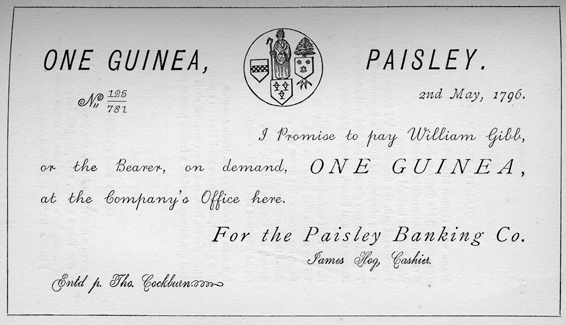THOU little badge of independence,
Thou mak'st e'en Pride dance mean attendance;
Thou sure hast magic in thy looks;
Gives poets taste for tasteless books;
Makes lawyers lie, makes courtiers flatter,
And wily statesmen patriots clatter ;
Makes ancient maids seem young again,
At sixty, beauteous as sixteen ;
Makes foes turn friends, and friends turn foes,
And drugmen brew the pois'ning dose,
And ev'n as common say prevails,
Thou mak'st e'en Justice tip the scale.
Note by the Author.—“Lines written on the back of a guinea note.”
These excellent lines on the corrupting influence of money were very appropriately written by the author on the back of a guinea note. Burns also wrote lines on the back of a bank note, and they appeared as a fugitive piece, but not in any of the editions of his works till Cunningham's of 1834. In 1663, during the reign of Charles II., a gold coin was minted which was called a “guinea,” from the gold of which the coin was made having been brought from Guinea, on the coast of Africa. It became a favourite coin in Scotland; and, in Paisley, it was called “a gold guinzie.” The coin in guinea gold at first represented 20s., but shortly afterwards it was converted, and re-stamped as of the value of £1 1s.,—
“The rank is but the guinea stamp,
The man's the gowd for a that.”
—Burns.
On banks being instituted in Scotland in 1695, guinea notes, representing the same value of £1 1s. sterling as the coinage of that name, were issued. The Paisley Banking Company commenced business on 1st October, 1783, in the house No. 28 Gauze Street, Paisley, (now belonging to Mr. Thomas Russell Cameron, surgeon-dentist,) and issued guinea notes. The above lines are here printed on the back of a representation of the guinea note of that Banking Company, which is a very fair imitation of the original guinea note, and will give our readers an idea of the form of that extinct Note of Issue. Subscriptions for benevolent objects and other kindred subjects are frequently solicited, and, in numerous instances, still made in guineas.—Ed.

[Semple 32]